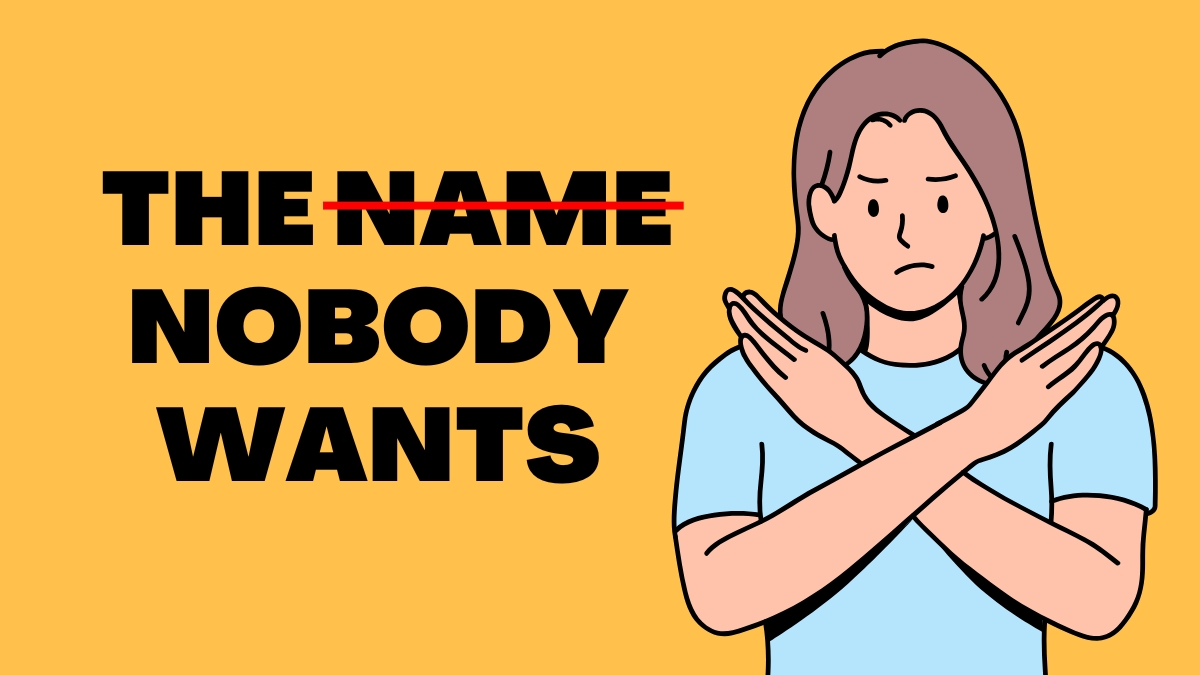How “Cursed” Names Shape Identity and Reputation
Most often, a name is a gift. In the hopes that it will have meaning, family history, or just be a nice sound, parents carefully select it. However, some names evolve over time, accumulating negative connotations that neither parent could have anticipated. Once popular and adored, these “cursed” names have turned become symbols of violence, controversy, or ridicule.
Take the German name Adolf, which was well-known before Adolf Hitler made it known. Or Karen, which started off as a common mid-century favorite but has since come to represent entitlement and tantrums in public. These instances show how something as private as a name may become a social burden due to language, culture, and collective memory.
When an Ordinary Name Turns Toxic
A name rarely starts out with a negative meaning. It acquires one through repeated cultural use and public conversation.
Historical Infamy
The most well-known example is Adolf. It was frequently included on baby name charts throughout Europe and even the US in the early 1900s. In every nation, the name fell after World War II. Parents completely avoided the connection, and many people legally changed their names to prevent it. Decades later, the name “Adolf” still brings up thoughts of Nazi horrors rather than any neutral identity.
Similar factors have contributed to the decline of other historical names. Due to his association with Benito Mussolini, Benito lost favor in Italy and elsewhere. Once praised for its depiction of a powerful warrior, Attila is still uncommon due to the meaning of invasion and devastation. These changes reveal how collective memory reshapes the life of a name.
Internet-Driven Shorthand
The story of Karen shows how quickly the internet can rewrite meaning. A simple first name became a worldwide emblem of privilege and rudeness thanks to memes of angry customers and viral videos of customer interactions. Statistics on baby names in the US revealed a dramatic drop by 2020. Parents who had adored the name for centuries changed their minds because they didn’t want their child to become the target of a meme.
The speed of the digital world surpasses that of traditional culture. Overnight, a single hashtag or viral video can ruin a reputation. A seemingly unremarkable name can quickly gain a reputation no one requested thanks to online venues that emphasize mockery.
Crime and Tragedy
Names associated with infamous crimes frequently experience sudden declines in popularity. “Jeffrey” dropped in the U.S. ranks for years after the Jeffrey Dahmer case took over the news. Names linked to well-known school shootings or serial crimes showed similar trends. Even though these names might get better with time, the impact is striking right away.
Temporary associations can be formed by even less well-known but often reported crimes. After dramatic trials linked names like Casey or Jodi to sad incidents, parents who might have thought about using those names paused.
Celebrity Scandals
Pop culture has the ability to forge strong yet transient connections. Depending on media coverage, names like Britney or Kanye have fluctuated in popularity. These drops nonetheless have an impact on parents looking through baby name lists, even though they are not as lasting as historical horrors.
The Personal Toll of a Stigmatized Name
It can be exhausting to live with a name that society fears or mocks. Even before meeting someone, individuals form stereotypes about them based on their name, according to research on name bias. Almost every social contact has been affected by those sudden choices.
- Employment and career bias. Recruiters scanning resumes may carry unconscious prejudice. A name connected to controversy can trigger hesitation or extra scrutiny.
- Bullying in school. Children often face teasing, whether it is Adolf being called a dictator or Karen becoming a running joke in the classroom.
- Dating and social life. In an age of online profiles, a name alone can spark jokes or cruel comments.
- Mental health strain. The need to constantly explain or defend a name can create anxiety and social withdrawal.
Reactions differ from person to person. Some embrace the challenge and use their name as a springboard for discussion. Others secretly change it by legally choosing a new identity or taking on a nickname. Every decision shows how the individual and society negotiate identity.
How People Reclaim Difficult Names
Language is fluid. A name that falls from grace can, over time, return to neutral or even positive territory. Reclamation takes patience and often collective effort.
- Positive representation. Popular characters in books, films, or television can soften a name’s harsh edges. A beloved protagonist or celebrity can rewrite the cultural script.
- Generational distance. After a few decades, new parents may view a once-taboo name as old-fashioned rather than offensive. Names associated with political unrest in the 1920s now sound quaint or even stylish.
- Acts of defiance. Some families deliberately keep or revive a stigmatized name to challenge public opinion, signaling that individuals—not history—define meaning.
Reclamation rarely happens overnight. Adolf remains a powerful cautionary tale, while other names, like Isis (once linked to the Egyptian goddess), are slowly separating from the terrorist group’s shadow.
Lessons for Parents Choosing Baby Names
Modern parents face a more connected world, where a single viral post can change perceptions in days. Many now research beyond traditional baby name books.
- Search engine checks. Parents Google potential names to see if any negative headlines or memes appear.
- Historical review. They consider not only family history but also global events, since news spreads instantly.
- Sound and spelling flexibility. Some parents modify spellings or choose variations to reduce unwanted associations.
Still, no amount of research can guarantee a name will remain untouched. The rise of social media means any ordinary name could become the next meme or hashtag.
Global Perspectives on “Cursed” Names
The phenomenon is not limited to English or Western culture.
- In Japan, certain characters are avoided because they carry unlucky meanings or echo infamous figures from history.
- In parts of Africa, names linked to colonial oppression may be discarded or replaced after independence movements.
- In Latin America, names tied to authoritarian regimes can still spark controversy decades later.
These trends demonstrate that although the terms used varies, the social dynamics, generational shift, public controversy, and collective memory are universal.
Digital Identity and Search Engine Shadows
A name is more than just a label on a birth certificate in the modern online world. It turns into a URL, a search phrase, and a lasting piece of digital history. The internet frequently makes things more difficult for people with names that are criticized.
- Search engine bias. A quick Google search can surface negative headlines or memes before a reader learns anything about the individual. Employers or potential clients may form opinions based on the first page of results.
- Social media tagging. Algorithms link posts, hashtags, and comments to a name, sometimes pushing unwanted associations into trending feeds. Someone named Karen may see unrelated memes appear every time friends tag them in a photo.
- Username scarcity. When a name is infamous, finding an available and neutral email address or handle can be difficult. Many people add numbers, middle initials, or creative spellings to avoid instant recognition.
Taking back a name is more difficult because of this digital layer. These days, reputation management companies assist people regulate what shows up when their name is searched. These tools show how a name’s online presence can significantly influence opportunity, even though they can also soften first impressions.
Legal Name Changes and the Cost of Reinvention
Many persons with highly stigmatized names find that changing their name formally is a useful first step toward a new beginning.
Although the procedure can be positive, there are financial and emotional factors to take into account.
- Court filings and fees. Most countries require a petition to a local court or civil registrar. Fees vary widely, from a small administrative charge to several hundred dollars, which can be prohibitive for some families.
- Document updates. Passports, driver’s licenses, social security records, and bank accounts must all reflect the new name. Each change carries additional costs and paperwork.
- Professional rebranding. People with established careers often need to update business cards, websites, and professional profiles to match their new identity.
- Emotional impact. While many feel relief, others struggle with the sense of leaving behind a part of their heritage or family story.
Despite the hurdles, legal name changes are rising in many regions. Some courts report steady increases in petitions tied to negative cultural associations or online harassment. The trend underscores how strongly public perception can influence private decisions.
Identity Beyond Labels
At its core, the controversy surrounding stereotyped names raises the question, to what extent does a person’s name define them? While names affect initial impressions, psychologists point out that character and behavior are more important in long-term relationships. Because they have to continually rebuild themselves on their own terms, people with challenging names frequently grow strong, funny, and strongly independent.
That endurance is commendable. In the short term, a name may open or close doors, but character, talent, and kindness create enduring reputations. Eventually, partners, friends, and coworkers see the real person rather than the stereotype.
Moving Toward Acceptance
The journey of a “cursed” name reminds us that identity is fluid. Today’s punchline could become tomorrow’s classic. Parents are unable to control cultural tides, but they can plan and conduct research. Individuals with challenging names demonstrate that self-worth and identity are more important than birth certificate letters.
Respecting people means releasing them from the misconceptions associated with meme culture or the past. When we meet someone named Karen or Adolf, the most human response is to see the person first and the stereotype second.
Conclusion
Names convey culture, memories, and occasionally controversy. No label can permanently define a person, but a nickname may rise and fall in response to public scandals, viral jokes, or political events. Resilience and character outlive cultural fads, as demonstrated by the tales of persons with notorious names.
Every name is essentially a story that belongs to the person wearing it, even in a society where meaning changes quickly.
Curious how names can also become currency? In our next article, Name Swap Economy, we examine the growing marketplace where usernames and digital handles are bought, sold, and traded — revealing how identity itself is turning into a valuable asset in the online world.



